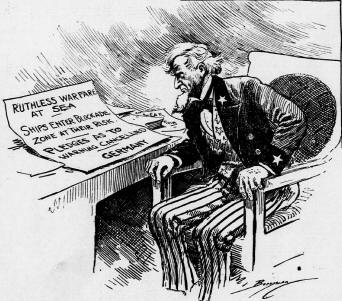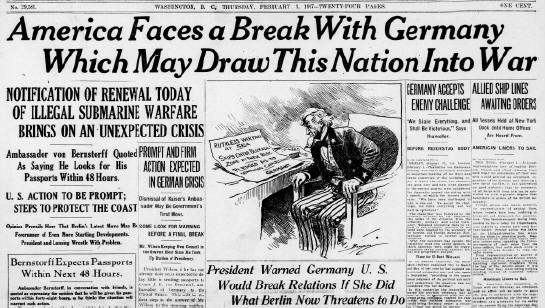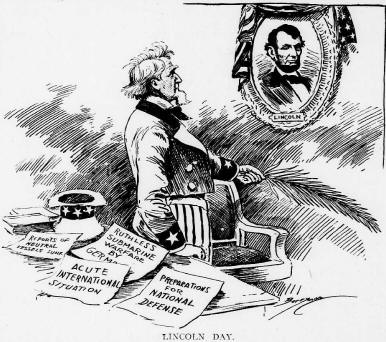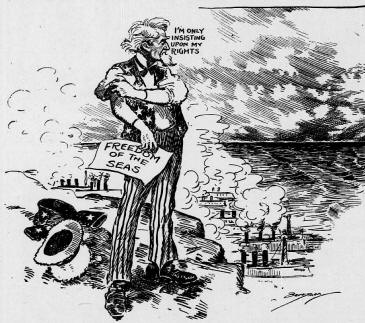February 1917
February 2
 Germany, in a note delivered to the Secretary of State on Wednesday, informed the United States that she would begin unrestricted submarine warfare on Thursday.
Germany, in a note delivered to the Secretary of State on Wednesday, informed the United States that she would begin unrestricted submarine warfare on Thursday.
Germany says that the object of this move is to blockade England to starve her out, in the hope of hastily ending the war.
The German ambassador is quoted as expressing the opinion that he expects to be given his passport within 48 hours. He said that for three weeks Germany has been preparing for the blockade of England, locating submarines, to the number of 400 or more, at intervals of 20 miles around the islands, covering every port on the
English and Irish coast.
In Berlin, the German Chancellor held a meeting with his ministers at which the entire war situation was gone over, and new steps planned by the Central Powers was considered. The Chancellor opened the meeting with: "We have been challenged to fight to the end. We accept the challenge; we stake everything and we shall be
victorious."
In his address, the Chancellor said that ruthless submarine warfare would bring Germany nearer to victory. "The moment has now arrived," he said, "last autumn the time was not yet ripe, but today the moment has come, when, with the greatest prospect of success, we can undertake the enterprise. We must, therefore, not wait any
longer."
"The most important fact of all for starting the submarine campaign now is that the number of our submarines has been very considerably increased as compared with last spring, and thereby, a firm basis for success has been established. The second reason is the bad cereal harvest of the world. This fact already confronts
England, France and Italy, with serious difficulties, which by means of unrestricted U-boat war will be brought to point of unbearableness. The coal question, too, is a vital question in war. Already it is critical in France and Italy. Our submarines will make it still more critical."
The prohibited area for neutral vessels under Germany's warning is bounded by a line running from the center of the Netherland’s coast, northward, blocking all of Denmark and the entrance to the Baltic, to the southern point of Norway; thence due west, skirting the southern part of the Faroe Islands; then west and south in a
grand square 300 to 400 miles to sea off the British Isles, to the junction of Spain and Portugal, apparently leaving the latter country open and affording a 20 mile safety zone along the northern Spanish coast to the French border.
Practically the whole Mediterranean is declared prohibited except a narrow strip almost paralleling the African coast, to appoint directly south of Greece, from which a 20-mile path to Greek territorial waters is declared open.
Germany's solitude with Greece was interpreted in some quarters as indicating that despite the Greeks’ acceptance of the Allied demands, Germany still hopes for change in the situation in that country. At present, however, this access to Greece is of little value, as the Allies still blockade that country.
On almost every side, Germany's drastic action is interpreted as an open confession of the effectiveness of the British food blockade. It is regarded as a determination to strike back. Admittedly, the plan is to carry starvation to the doors of England with swift, staggering strokes in fulfillment of Germany's announced
determination to use every weapon in agency at her command to end the war quickly. She counts on the operations of an unheard of number of submarines to deliver blows to bring England to her knees within 60 days.
In the past, Germany had pledged to keep submarine activities within international law, but threatened a resumption of unrestricted submarine warfare if the United States did not succeed in lifting British restrictions on neutral commerce to Germany. "Neutrals," said Germany, "cannot expect that Germany, forced to fight for
her existence, restrict the use of an effective weapon if her enemies are permitted to continue to apply, at will, methods of warfare violating the rules of international law.
Immediate construction of 100 submarines, 80 for coastal defense and 24 fleet operations, was proposed in a special bill introduced today by Sen. Poindexter of Washington. These would be in addition to the 18 submarines proposed in the naval bill now pending in the House. If the bill is passed, the United States would have
about 200 serviceable submarines and that would be a smaller number compared to other great navies.
February 9

On Saturday, diplomatic relations with Germany were broken off. The German ambassador was handed his passports and the American ambassador in Berlin was ordered home. In the ordinary intercourse of nations’ severance of diplomatic relations is a forerunner of a declaration of war, though there are recorded instances where the
step has been taken without actual war having resulted.
Peaceful continuation of German-American relations after the departure of their respective ambassadors appears to be very slight. Germany, so the Associated Press was informed, resorted to this measure after the shameful rejection by the Allied powers of her peace overtures, and only reluctantly took the step promising a
speedy end to the war.
Spain formally notified the State Department today of its willingness to take over American interests in Germany. Holland has notified the State Department of its willingness to take over British interest in Germany formally represented by the United States. The Swiss government has announced that they will handle German
affairs in the United States.
Whatever may be their feelings towards the United States, Germans have manifested consideration and courtesy towards Americans since the news was received of the breaking off of diplomatic relations. Aside from an occasional frank comment on the action of the American government, no acts of hostility or even unfriendly nature
have been reported thus far, and many Germans are going out of their way to show friendly disposition towards Americans. The treatment of Americans brings encouragement to those who hope the breach between the two countries will go no further and the severance of diplomatic relations.
The American embassy pulled down the stars and stripes on Tuesday. The scene that morning in the embassy was chaotic. Crowds of anxious Americans blocked the corridors seeking the renewal passports, and advice for their future course in regard to possible routes back to America. All embassy rules went by the wayside for the
occasion. Several secretaries were stationed in the corridors to answer questions. The passport department worked at full speed extending and renewing passports.
An interesting question already has risen regarding the status of the ambassador of the Austro-Hungarian Empire. As an ally of Germany, it is expected that the Austrians will also employ unrestricted submarine warfare. If this is so, it is expected that the United States will also sever diplomatic relations with that country
as well as Turkey and Bulgaria.
Norway, Denmark, and Sweden have not agreed to President Wilson's suggestion in regard to breaking relations with Germany. The Scandinavian countries, which had given full support to the President’s piece move, said they saw no reason why a few weeks later they should follow Mr. Wilson and take steps that are generally
considered to be a prelude to war. Spain also has refused to break diplomatic relations with Germany, as has Switzerland. "Having common frontiers were Germany and Austria" a Swiss newspaper stated, "we are already close to the battlefront, the dangers to which we should be exposed with the enormous and the United States would not be in a position to
come to our rescue."
Allied diplomats have frankly expressed their hopes that the United States will not actually enter the war. Several of the Allied representatives have let it be known that they entertain a growing fear that Germany deliberately precipitated a break with this country to hold American munitions and supplies here, thus cutting
off imports to the Allies probably more effectively than any single step that the Central Powers could take.
Immensely gratified over the break with Germany and the moral condemnation thereby implied, the diplomats did not conceal their fear that military precaution may force the United States to keep at home a considerable part of supplies now prepared for shipment to the Allies. Such an outcome, they say, would more than compensate
for a mere break in relations from the German viewpoint.
Even if the United States, in the event of war, should undertake to raise and equip an army for operations in Europe, it would require nearly a year of training, it is declared before that it would be wise to send the forces to the front. In the meantime, all the effort and energy that this country might be putting forth
towards the military defeat of Germany would go into channels that could not lead to that end.
The greatest military aid hoped for from this country, in Allied circles in the case of actual war, is the safeguarding of American trade channels, including the American and other route to Europe. This is a matter of first importance and provided a heavy task for the American naval forces.
In ports under the dominion of the American people there are 105 German and Austrian vessels. Should war with Germany be declared, these vessels would be at the mercy of the United States. Their seizure by American authorities might provide a considerable, and much needed naval auxiliary for our fleet; as all experts agree
that our navy could cross the ocean without being dependent on supplies upon auxiliary ships of other nations. However, there is no intention on the part of the United States to seize the German merchantmen laid up in American ports as matter now stands. Such a step admittedly would be an act of war, which the government has no intention of
committing.
On Sunday, the crew of the German auxiliary cruiser, Kronprinz Wilhelm and Prinz Friedrich, were removed by the Commandant of the Philadelphia Navy Yard to safeguard the interned ships. Having voluntarily submitted to internment, these vessels actually are in the custody of the United States government, subject to such
disposition of ships and crews as the government sees fit to make. The Kronprinzessin Celille in Boston and the prize ship Appam in Newport News, were taken over by United States Marshals. These vessels were already technically in the custody of the US, but the crews have been permitted to live aboard and continue physical possession under bonds
given by the German government.
Meanwhile, it was also reported that the American steamship Housatonic was sunk on Sunday by a German submarine off the Scilly Islands. All the officers and crew were saved. The ship carried 144,209 bushels of wheat and was bound from Galveston to London.
February 16
 Germany is understood to have sent a note to the United States via Switzerland suggesting that the two governments discuss ways of preventing actual war between them. Germany is understood to make it clear that despite the fact diplomatic relations had been broken,
she greatly desires that peace be maintained. Preliminary outlines regarding the communications do not indicate that it carries with it any suggestion that Germany may modify its submarine warfare. However, the note clearly invites this government to make suggestions regarding steps that might prevent war.
Germany is understood to have sent a note to the United States via Switzerland suggesting that the two governments discuss ways of preventing actual war between them. Germany is understood to make it clear that despite the fact diplomatic relations had been broken,
she greatly desires that peace be maintained. Preliminary outlines regarding the communications do not indicate that it carries with it any suggestion that Germany may modify its submarine warfare. However, the note clearly invites this government to make suggestions regarding steps that might prevent war.
In seeking an exchange of views on the subject of preventing war between the two countries, the German government’s move is understood to be predicated upon the willingness of Germany to discuss the safeguarding of American ships and American lives on the seas. Just how American interests will be however, and whether any
specific means of preserving peace between the two nations is included in the communication has not been revealed.
One of the principal questions discussed at the Cabinet meeting late yesterday was to threaten the hampering of American industry by ships held up in American ports out of fear of risking destruction by submarines. Unless the United States government provides convoys, or guns and gunners protected ships, the American Line,
owners of the steamships St. Louis, St. Paul and other liners, said they would not send them across the Atlantic. This decision was reached after the failure of efforts to provide their own defensive armament.
"As far as the American Line is concerned," said the President of the company, "we have done our best to secure the necessary guns and gun crews, but it does not seem possible that private corporations will be able to properly equip their ships with defenses. Unless the government decides either to provide convoys or to put on
each of our steamers guns and train gunners essential to the safety of the passengers and crews, we will not sail."
The President of the company pointed out that French and British ships are sailing to the port without fear of German submarines because they are armed, but American Line ships have not even a single gun to protect itself in case of an emergency. "We should have the guns of six-inch caliber and crews to man them. There are too
many lives and too much property at stake to send ships out unprotected."
While it has been indicated at the State Department that there can be no legal objection to the government furnishing guns to American merchantmen, President Wilson is understood to be unwilling to take any steps that might give Germany the slightest ground for throwing responsibility for any future trouble upon the United
States.
According to passengers arriving here on the Canard liner Andania; a funnel shaped zone of armored patrol ships, which extends 300 miles from the British Isles Westwards, has been established by the British Admiralty. Light cruisers, patrol boats and armed trawlers literally lined the course taken by the ship until she was
safely out of the war zone it was said.
At times, the patrol boats were so close to the Andania that better passengers said they appeared to be separated by less than half a mile at the closest places. At the western end of the line however, the ships were more spread out. The Andania sailed from Liverpool January 31; the day of the German note of intention to
resume unrestricted submarine policy was delivered to President Wilson. The Admiralty, according to the ship's passengers, apparently had anticipated this move on the part of Germany and had for weeks previously been equipping a large fleet of patrol boats to protect transatlantic liners.
Officers of the British merchantmen are more reticent, particularly in regard to the new and strange courses they must now follow in the eastern Atlantic in order to avoid the old established steamship lines. It is understood that British skippers, before sailing, receive sealed orders from the Admiralty which they open before
taking her new observations and follow the course laid down by these orders unless they are changed by wireless. In this way, it is said, the British Admiralty knows approximate locations of every merchantman on the high seas.
A steel net designed to protect the port of New York from hostile submarines and other war craft, in the event of war, was put in place at the entrance to the harbor today. For the present, it will be kept in position only between sunset and sunrise and will bar all ships from entering and leaving the harbor during the night.
The net was lowered to the bottom of the channel and anchors secured it to the bottom and buoys kept the top of the net near the surface. The old monitor, Amphitrite, will be in change of the operation.
February 23
 The Austro-Hungarian situation is perhaps more delicate at this time than any of the diplomatic negotiations of the United States have been since the war in Europe began. For the sake of the many Americans in Austria-Hungarian, Bulgaria and Turkey, who have not yet
left those countries, the United States is extremely reluctant to sever diplomatic relations with Vienna. If such a break should come, a break would also likely come, it is believed, with Bulgaria and Turkey.
The Austro-Hungarian situation is perhaps more delicate at this time than any of the diplomatic negotiations of the United States have been since the war in Europe began. For the sake of the many Americans in Austria-Hungarian, Bulgaria and Turkey, who have not yet
left those countries, the United States is extremely reluctant to sever diplomatic relations with Vienna. If such a break should come, a break would also likely come, it is believed, with Bulgaria and Turkey.
Administration officials are taking stock today of an apparent growing discrepancy between Germany's words and Germany's deeds. The belief that the American sailors that have been captured have been released, and the fact that the American relief committee is not to be thrown out of Belgium forth with, and the belief that the
American liner Philadelphia has passed through the submarine area without hostile action by German submarines against her, are circumstances which are being seen as rays of hope. There is, indeed, a well-defined opinion that the international situation created by Germany's threat offers a brighter prospect today then it offered two weeks ago.
Nevertheless, it seems almost certain that President Wilson will go before Congress to ask for additional authority to protect American seamen and ships against the German submarine menace.
Officials believe, notwithstanding her threats, that Germany is endeavoring to avoid embroiling herself with neutral governments more than absolutely necessary. Friends of Germany point to the treatment of the crew of the Housatonic, the first American ship to be sent to the bottom after the beginning of Germany's new
submarine warfare, by the German submarine that sank her.
The U-53 was the German submarine that suddenly appeared at Newport last fall and later sank several ships off of Nantucket. The captain of the Housatonic said the commander of the German U-boat treated him and his men with courtesy. The U-Boat commander expressed regret at having to destroy his ship, explaining that it was
necessary, as she was carrying food supplies for the enemy of his country.
The sinking of the Housatonic took place about 20 miles off the British coast, the captain said, and at first the U-Boat commander was going to turn the Housatonic's crew adrift in small boats, but was prevailed on by the ship's captain to tow them towards the shore, which the U-Boat captain agreed to do. As they were being
towed, a British patrol boat appeared on the horizon. The U-boat captain fired a shot across the bow of the British patrol boat to get their attention and when the patrol boat turned towards them, the U-Boat captain saluted the captain of the Housatonic, cut the lines with the lifeboats, and submerged. Leaving the crew of the Housatonic to be safely
rescued by the British patrol boat.
Great Britain has announced a new danger zone, seeking to block practically all exit routes of the German U-Boat from their bases in Germany and Belgium. With the English Channel practically closed by an elaborate system of nets, mines and patrols, the means of exit for the submarines has been through the route north of
Scotland and down the Irish coast. The new danger zone, designed to close that way out, is understood to have been strewn with mines.
A copy of the notice warned that shipping areas in the North Sea will be rendered dangerous to all shipping by operations against the enemy and it should therefore be avoided. Another notice addressed tightening the blockade of the countries with which Great Britain is at war. The later notice required all neutral ships on the
way to, or from, a port in a neutral country with means of access to enemy territory to stop at a British or allied port and be searched to determine if they are carrying goods for enemy destination or of enemy origin.
Premier Lloyd George said in a speech in the House of Commons this week that the stocks of food in Great Britain at the present time are lower than they have ever been before. It was essential for the life of this nation, he declared, that every possible effort be made to increase home production. Enormous sacrifices were
necessary from the British public, said the premier. He stated that the government proposed to dispense with all non-essential importation to save tonnage.
Importers of American goods feel themselves particularly hard hit by the latest restrictions upon imports. The goods most drastically affected include agricultural machinery, typewriters and other office equipment, boots and shoes, cotton hose three, apples, wood cut timber. One notable exception, however, is tobacco
exporters. The British are now importing more tobacco now than prior to the start of the war.
The British claim they bagged six U-Boats with the aid of an undersea microphone. Two microphones were set up just offshore, twenty miles apart. By triangulation between the two microphones, noises were located 70 miles from shore and the approximate position was established. Computations at intervals disclosed that the sounds
were moving, the direction of the movement was determined, British naval ships were dispatched to the indicated position and six U-boats were discovered and sunk.
When it was certain that the sound heard was from a submarine, efforts to determine what the noise was resulted in finding that the rotation of motor made the rheumatic sound. A German spy alerted the German admiralty, which immediately withdrew all U-Boats in the channel. When their activities were resumed, it was found that
the microphones did not record the rhythmic sound. The assumption is that the Germans had soundproofed the machines.
Read past editions of News Reports From the Front
Have a newspaper clipping on a event that took place in Emmitsburg?
If so, send it to us at history@emmitsburg.net